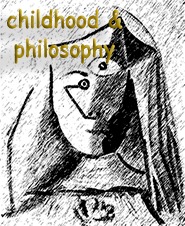o papel da dúvida na investigação filosófica colaborativa com crianças
DOI:
https://doi.org/10.12957/childphilo.2021.59436Palavras-chave:
filosofia, investigação, colaboração, dúvida, pedagogia.Resumo
Este artigo examina a dúvida epistêmica cultivada no contexto da investigação filosófica colaborativa (IFC) com crianças de 2 a 7 anos numa escola primária no interior de Brisbane, Austrália. O artigo documenta e categoriza episódios de dúvida epistêmica expressada por crianças conforme elas participavam de extensivas sessões baseadas no design da IFC. A dúvida epistêmica é tratada de acordo com as noções pragmáticas desenvolvidas por Charles Sanders Peirce (1877), que sustentava que o espaço para a investigação é formado entre uma "dúvida genuína" e uma crença fixa ou estabelecida. O processo de investigação é genuinamente provocado quando uma experiência "real" provoca em alguém um senso de desequilíbrio, resultando na necessidade de revisar uma crença já existente. Mais tarde, ele propôs que o processo pode começar com uma "dúvida cultivada" (para além de uma dúvida genuína), iniciada dentro do processo de investigação pelo desejo do/a/s pesquisador/es/as de rever suas próprias crenças e assunções existentes. O cultivo da dúvida provocaria então um exame mais profundo e a reavaliação destas crenças, levando assim à dúvida genuína em um ponto no meio da investigação. A dúvida expressa pelos alunos neste estudo surgiu do discurso e da indagação em sala de aula, ao invés de espontaneamente por meio da experiência direta, portanto seria considerada dúvida cultivada. Duas categorias distintas de dúvida cultivada foram encontradas: a dúvida como um processo interativo dentro do grupo que intensifica a investigação coletiva; dúvida como o próprio objeto de investigação. Quando a dúvida era o objeto da investigação, as crianças procuravam distinguir suas características e como funcionava dentro do grupo para manter o diálogo. O artigo aprimora nossa compreensão da dúvida cultivada durante a IFC e demonstra que mesmo os alunos muito jovens podem se envolver no exame coletivo das características da dúvida. As implicações para os educadores são elaboradas em termos de práticas pedagógicas que envolvem as crianças de forma produtiva na exploração da dúvida epistêmica.
Downloads
Referências
Brown, A. L. (1992). Design experiments: Theoretical and methodological challenges in creating complex interventions in classroom settings. The Journal of the Learning Sciences, 2(2), 141–178.
Burgh, G., Field, T., & Freakley, M. (2006). Ethics and the community of inquiry: Education for a deliberative democracy. Sydney, NSW: Thompson Social Science Press
Burgh, G., & Thornton, S. (2016). Lucid Education: Resisting resistance to inquiry. Oxford Review of Education, 42(2), 165–177. http://doi.org/10.1080/03054985.2016.1151410
Burgh, G., & Thornton, S. (2019). Ecosocial citizenship education: Facilitating interconnective, deliberative practice and corrective methodology for epistemic accountability. Childhood and Philosophy, 15, 43-61. https://doi.org/10.12957/childphilo.2019.42794
Burgh, G., Thornton, S., & Fynes-Clinton, L. (2018). ‘Do not block the way of inquiry’: Cultivating collective doubt through sustained deep reflective thinking. In F. García Moriyón, R. Robles Loro & E. Duthie (Eds.), Family Resemblances in Philosophy for Children. Madrid: Anaya.
Cam, P., Fynes-Clinton, L., Harrison, K., Hinton, L., Scholl, R. & Vaseo, S. (2007). Philosophy with young children: A classroom handbook. Deakin West, ACT: ACSA Inc.
Chesters, S. D., Fynes-Clinton, L., Hinton, L., Scholl, R., & Australian Curriculum Studies Association. (2013). Philosophical and ethical inquiry for students in the middle years and beyond. Deakin West, A.C.T: Australian Curriculum Studies Association.
Davydov, V. V., & Kerr, S. T. (1995). The Influence of L. S. Vygotsky on Education Theory, Research, and Practice. Educational Researcher, 24(3), 12. https://doi.org/10.2307/1176020
Davey Chesters, S. (2012). The Socratic classroom: reflective thinking through collaborative inquiry. Rotterdam; Boston: SensePublishers. Retrieved from http://site.ebrary.com/id/10603193
Dewey, J. (1916). Democracy and Education. New York: The Free Press.
Dewey, J. (1997). How we think. New York: Dover.
Fynes-Clinton, E (2018). Deep reflective thinking through collaborative philosophical inquiry. PhD Thesis, School of Education, the University of Queensland. https://doi.org/10.14264/uql.2018.809
Fynes-Clinton, E. & Renshaw P. (June, 2016) Genuine doubt and collaborative philosophical inquiry: Towards a more democratic school culture. Symposium presentation. The 12th International Conference of Learning Sciences (ICLS), Singapore.
Gorard, S., Smith, E., May, H., Thomas, L., Adnett, N., & Slack, K. (2006). Review of widening participation research: addressing the barriers to participation in higher education. Bristol: HEFCE.
Haynes, J. (2008) Children as Philosophers. Second edition Routledge
Haynes, J., & Murris, K. (2013). The realm of meaning: Imagination, narrative and playfulness in philosophical exploration with young children. Early Child Development and Care, 183(8), 1084-1100.
Hildebrand, D. L., (1996). Genuine doubt and the community in Peirce’s theory of inquiry, Southwest Philosophy Review, 12, 33-43.
Johanson, A. E. (1972). Paper doubt, feigned hesitancy, and inquiry. Transactions of the Charles S. Peirce Society, 8(4), 214-230.
Lipman, M. (1988). Philosophy goes to school. Philadelphia: Temple University
Lipman, M. (2003). Thinking in education. New York: Cambridge University Press.
Lipman, M. (2008). A life teaching thinking. Montclair, N.J.: The Institute for Advancement of Philosophy for Children.
Lipman, M., Sharp. A.M. & Oscanyan, F.S. (1980). Philosophy in the classroom. Philadelphia: Temple University Press.
Murris, K. (2016). The posthuman child: Educational transformation through philosophy with picturebooks. London; NY: Routledge, Taylor & Francis Group.
Pardales, M.J., & Girod, M. (2006). Community of Inquiry: Its past and present future, Educational Philosophy and Theory, 38(3) 299-309.
Peirce, C.S. (1887). The fixation of belief, Popular Science Monthly, 12, pp. 1-15
Peirce, C. S. (1955). The philosophical writings of Peirce. Ed. J. Buchler (New York, Dover)
Peirce, C.S. (1899). ‘First Rule of Logic’. In Peirce Edition Project (Ed.), (1998), The Essential Peirce: Selected philosophical Writings, Vol. 2 (pp. 42–56). Bloomington: Indiana University Press.
Renshaw, P. (2016). On the notion of worthwhile agency in reformist pedagogies. Learning, Culture and Social Interaction, 10, 60–63.
Silverman, D. (2000). Doing qualitative research: A practical handbook. Thousand Oaks, CA: Sage Publishers.
Turgeon, W. C. (2015). The Art and Danger of the Question: Its Place Within Philosophy for Children and Its Philosophical History, Mind, Culture, and Activity, 22:284-298, http://doi.org/10.1080/10749039.2015.1079919
Vygotsky, L. S. (1978). Mind in society: The development of higher psychological processes (M. Cole, Trans.). Cambridge: Harvard University Press




